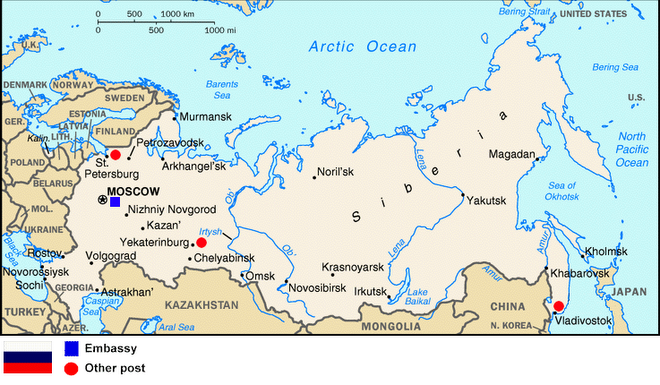
I had a staffer put this together for me today (posted alongside); the current (alleged) tariff for bribery in Russia (overall I think it is 15-20% light of real costs, but that is IMHO, so there).
Across my screen today I also saw a Deutsche Bank piece:
Electricity and heat supply outages across Russia
Deutsche Bank
Across my screen today I also saw a Deutsche Bank piece:
Electricity and heat supply outages across Russia
Deutsche Bank
February 14, 2008
There have recently been a number of accidents across the country resulting in temporary electricity and heat supply outages. Interfax reports that an equipment failure at the Carevskaya power substation in the Astrakhan region led to the electricity supply for almost 36,000 people being interrupted. Separately, the Krasnoyarsk governor blamed poor maintenance works at Eniseiskaya TGK for a number of failures in heat supply this winter, Interfax reports. There was also a fire at CHP-1 (TGK-14) in Ulan-Ude.
In our view, nearly all these accidents were the result of more than a decade of underinvestment in the sector [Exile's emphasis]. However, thanks to privatization and the liberalization of the sector, a significant amount of money has been raised for capex needs in almost all of sub-sectors. Nevertheless, such accidents highlight the technological risks of the sector and as most of the grid's and generation equipment is worn out, we cannot exclude there being further outages in the future. -1-140208
Heretofore, Anatoly Cubais’s great ‘unbundling’ of the Russian power monopoly has made middle-ish management, of variable talent (variable, because some are world-class), rather staggeringly rich. It is to be seen if it will be remotely effective in keeping Russian lights or furnaces burning bright (let alone Moscow AirCon systems running cool in summer) in the years to come.
Although not presently (yet) directly a fee-related interest, I am following the Russian GenCo-Distribution systems carefully (I cut my industrial-political teeth, as a lobby-ling, on the European gas and nuclear power sectors).
In 2009, I think one of the more conceptually interesting IPOs will be Inter RAO: the electricity trading arm of the dying behemoth, RAO UES. As I have written for someone elsewhere (not on the web), hydro-power from Kyrgyzstan, grid-linked to Russia, looks a good PPP/PFI investment bet. Ditto, strategic partnerships for foreign firms in the GenCo sector, prepared for an ‘RPI+/-x’ long-term-like concession.
Indeed, if Europeans can put aside their mono-dimensional bleating about ‘energy security’ for just a tiny moment, they will see (as I write in one of those rather dry, slightly neo-con-ish, US geo-political journals next month):
‘Energy security is a two-way street. Although we think of Russia as an exporter of oil and gas it is, and will increasingly become, an electricity importer. Over the three electricity Russian IPOs/privatisations we have worked on [in 2007] during the break up of the RAO UES monopoly, we see how truly inter-connected Europe’s energy markets and energy best interests are.
“Russia’s own electricity needs mean that it is already importing electricity from Kazakhstan; and shortly will import – in scale – hydro-electric power from Kyrgyzstan. The RAO UES subsidiary, INTER RAO (itself a likely IPO candidate in, perhaps, 2009) is the fascinating business that imports all this power, and looks enviously at the possibility of importing electricity from the generators of Central Europe; if only it can raise the billions of Euros necessary to build the inter-connecters between Russia and the CEE nations [Exile: which is now the reason why Gazprom is looking to buy European GenCos -they are buying Russia’s energy security for 2015+ ].
“So let us all conclude that energy security is a two-way street: raw materials in one direction and electricity in the other. In fact, in any debate concerning energy security it is good to remember that very few people come to the debate objectively and without an agenda. The EU institutions want to control one of the largest aspects of the EU combined economy, national sovereign determination of which member states have jealously guarded. Russia is frequently criticised but perhaps should do more to put forward its own case.”
As is unfathomably often the case for hydrocarbon-rich countries, Russia is hydrocarbon rich, but electricity poor (the same is true, BTW, for Saudi Arabia, Iran, Venezuela and even Kazakhstan).
And in Russia, this electricity ‘poverty’ is really beginning to show. This is an area that takes more than six months’ central pump-priming, highly visible, Kremlin investment to cure. Not least as, for Russia, GenCo infrastructure is only part of the challenge. It’s the ‘wires’ and the sub-stations too: now that’s fiddly and relatively expensive to do and… er… becoming really quite vital to medium-long term, Russian economic vibrancy.
PS: understand this sector and you see that Kazakhstan’s interest in buying some of Westinghouse is, actually, very, very clever.





No comments:
Post a Comment